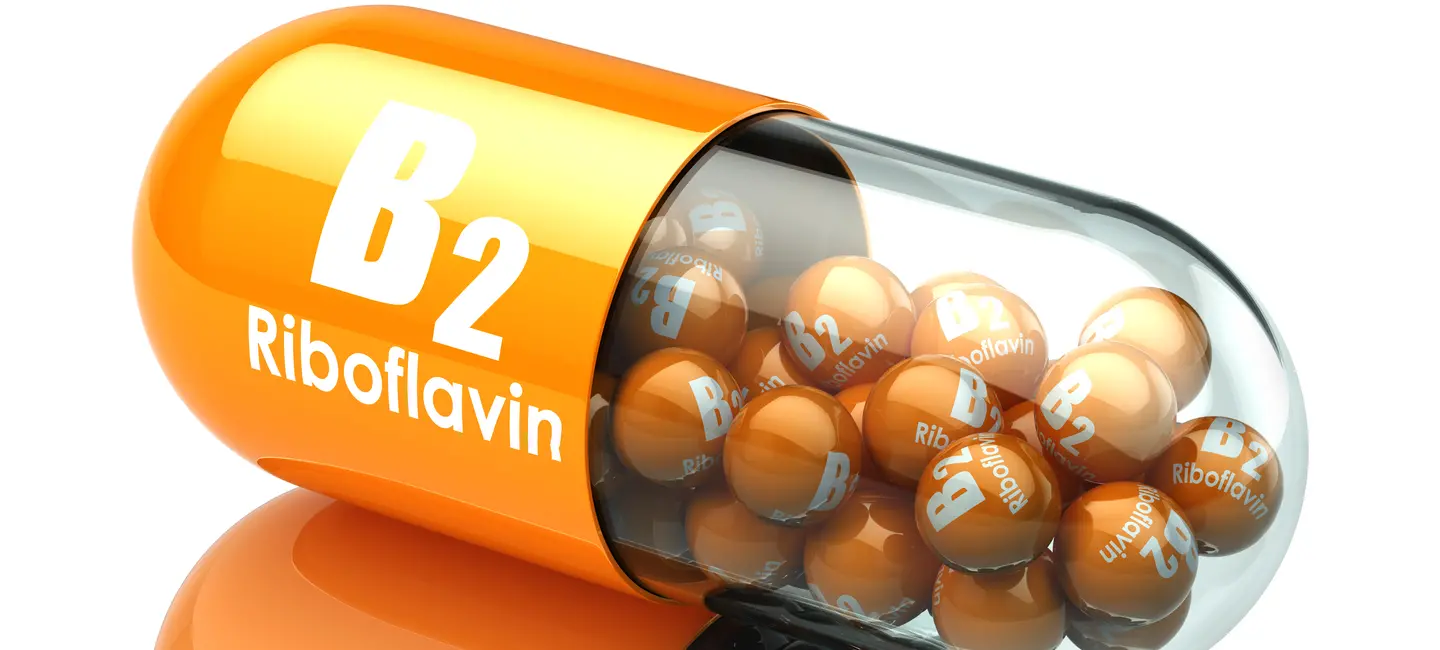
Riboflavin is vitamin B2. It is widely found in both plant- and animal-based foods, including milk, meat, eggs, nuts, enriched flour, and green vegetables.
Riboflavin is involved in many body processes. It's required for the proper development of the skin, lining of the digestive tract, blood cells, and brain function.
People most commonly use riboflavin to prevent riboflavin deficiency, for migraine, and for high levels of homocysteine in the blood. It's also used for acne, muscle cramps, and many other conditions, but there is no good scientific evidence to support these other uses.
Is It Effective?
NatMed Pro rates effectiveness based on scientific evidence according to the following scale: Effective, Likely Effective, Possibly Effective, Possibly Ineffective, Likely Ineffective, Ineffective, and Insufficient Evidence to Rate.
- Riboflavin deficiency (ariboflavinosis). Taking riboflavin by mouth can increase levels of riboflavin in the body, helping to treat and prevent riboflavin deficiency.
- High levels of homocysteine in the blood (hyperhomocysteinemia). Taking riboflavin by mouth for 12 weeks decreases levels of homocysteine by up to 40% in some people with a specific gene type.
- Migraine. Taking high-dose riboflavin by mouth seems to modestly reduce the number and severity of migraine headaches in adults. It's unclear if it helps children.
There is interest in using riboflavin for a number of other purposes, but there isn't enough reliable information to say whether it might be helpful.
Is it Safe?
When taken by mouth: Riboflavin is likely safe for most people in doses of up to 400 mg daily. In some people, riboflavin can cause the urine to turn a bright yellow color. It may also cause nausea.
Special Precautions & Warnings:
Pregnancy and breast-feeding: Riboflavin is likely safe when consumed in amounts commonly found in foods. The recommended intake is 1.4 mg daily during pregnancy and 1.6 mg daily during lactation.
Children: Riboflavin is likely safe for most children when consumed in amounts commonly found in foods. Higher doses of 100-200 mg daily have also been safely used.
Liver disease: Riboflavin absorption is decreased in people with liver disease.
Antibiotics (Tetracycline antibiotics)
Interaction Rating=Moderate Be cautious with this combination.
Riboflavin might decrease the amount of tetracyclines that the body can absorb. Taking riboflavin along with tetracyclines might decrease the effects of tetracyclines. To avoid this interaction, take riboflavin 2 hours before or 4 hours after taking tetracyclines.
Blond psyllium: Psyllium reduces absorption of riboflavin from supplements in healthy individuals. It isn't clear whether it reduces absorption of riboflavin found in foods, or whether this interaction can impact health.
Boron: A form of boron, called boric acid, might reduce the absorption of riboflavin.
Iron: In people with riboflavin and iron deficiency, riboflavin supplements may improve the effects of iron supplements.
Taking riboflavin supplements with food might increase how much riboflavin the body absorbs.
Riboflavin is an important nutrient that is found in many foods. The amount that should be consumed on a daily basis is called the recommended dietary allowance (RDA). For adult males, the RDA is 1.3 mg daily. For adult females, the RDA is 1.1 mg daily. During pregnancy, the RDA is 1.4 mg, and during breastfeeding, the RDA is 1.6 mg. Recommended amounts for children depend on age.
Riboflavin is also available in supplements. Taking riboflavin supplements with food will increase how much the body absorbs. Speak with a healthcare provider to find out what dose might be best for a specific condition.
B Complex Vitamin, Complexe de Vitamines B, Flavin, Flavine, Lactoflavin, Lactoflavine, Riboflavin 5' Phosphate, Riboflavin Tetrabutyrate, Riboflavina, Riboflavine, Vitamin B2, Vitamin G, Vitamina B2, Vitamine B2, Vitamine G.
Information on this website is for informational use only and is not intended to replace professional medical advice, diagnosis, or treatment. While evidence-based, it is not guaranteed to be error-free and is not intended to meet any particular user’s needs or requirements or to cover all possible uses, safety concerns, interactions, outcomes, or adverse effects. Always check with your doctor or other medical professional before making healthcare decisions (including taking any medication) and do not delay or disregard seeking medical advice or treatment based on any information displayed on this website.
© TRC Healthcare 2024. All rights reserved. Use and/or distribution is permitted only pursuant to a valid license or other permission from TRC Healthcare.
